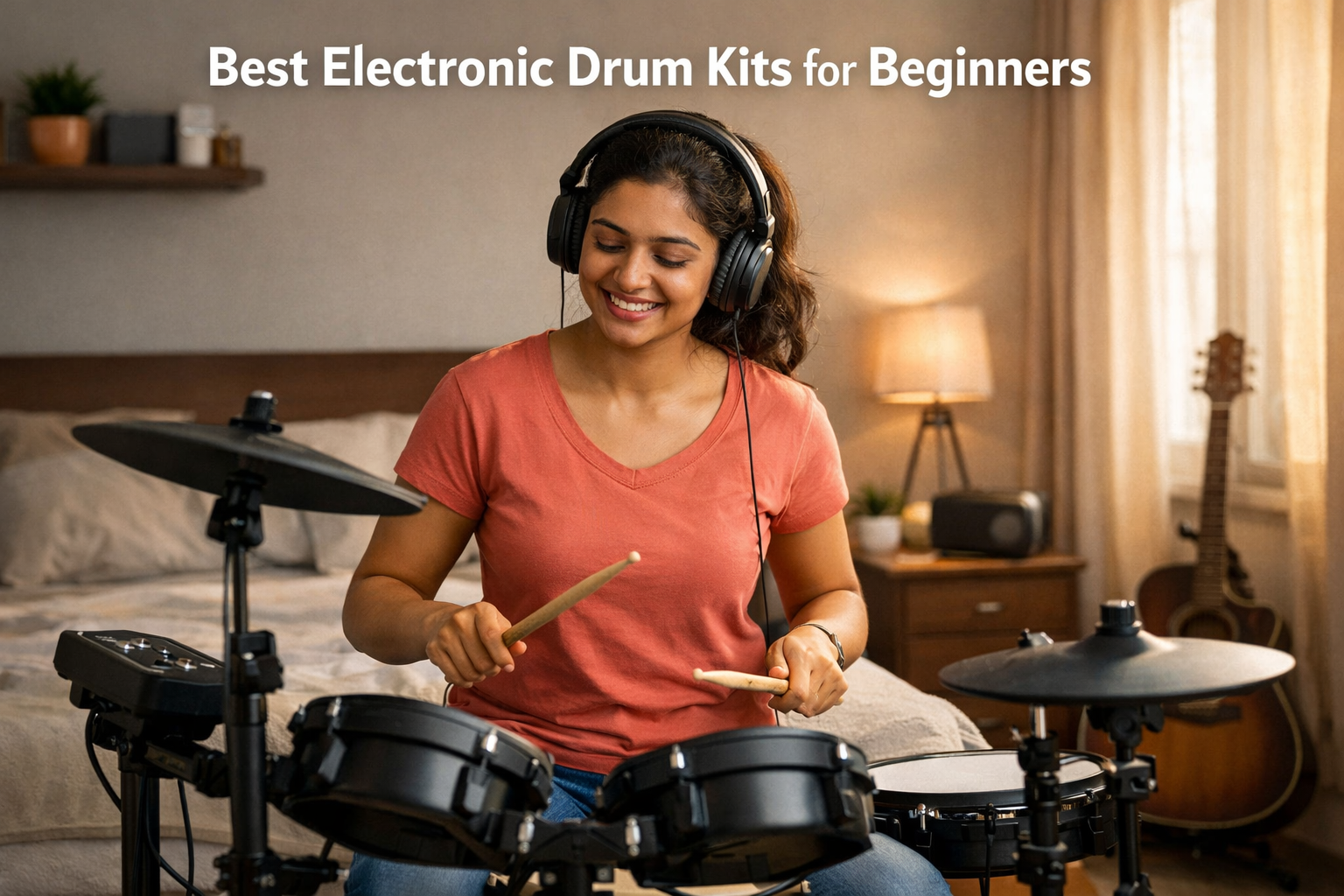Starting your musical journey is exciting, but the path to mastery is filled with challenges. As a beginner, it's easy to fall into traps that can slow your progress or, worse, lead to burnout. From picking the wrong gear to practicing inefficiently, understanding these common pitfalls is the first step toward a more enjoyable and successful learning experience.
Here are five of the most common mistakes every beginner musician makes and practical tips on how to avoid them.
Mistake #1: Rushing to Buy Expensive Gear
It's tempting to think that a top-of-the-line guitar, a professional-grade keyboard, or a premium microphone will instantly make you a better musician. The allure of fancy equipment is strong, but for a beginner, it's often an unnecessary and overwhelming expense.
Why it's a mistake:
- You don't need it: An expensive instrument won't compensate for a lack of skill. The foundational techniques you need to learn can be mastered on a good, affordable beginner instrument.
- Depreciation: Beginner instruments often have a better resale value. If you decide music isn't for you, it's easier to sell a ₹10,000 guitar than a ₹1,00,000 one.
- Overwhelm: High-end gear often comes with complex features and settings that can be confusing for a newcomer.
How to avoid it:
- Start with a quality beginner kit: Brands like Kadence, Juarez, and Yamaha's student series offer excellent starter instruments that are durable and have a good sound.
- Focus on the basics: Spend your initial time and energy on learning scales, chords, and basic theory. Your hands and ears are the most important tools you have.
- Talk to an expert: Before you buy, consult a music teacher or a professional at a reputable music store like Bajaao. They can guide you toward an instrument that fits your budget and needs.
Mistake #2: Practicing Without a Plan
Many beginners sit down with their instrument and simply "noodle" around, playing a few random chords or scales they remember. While this can be fun, it's not a substitute for structured practice.
Why it's a mistake:
- Lack of progress: Without a clear goal, your practice sessions won't build on each other. You'll end up repeating the same mistakes and not learning anything new.
- Inefficiency: "Noodling" can create bad habits that are difficult to unlearn later. For instance, playing a chord with incorrect finger placement can feel right at first, but it will hinder your ability to play more complex songs.
- Loss of motivation: When you don't see tangible progress, it's easy to get discouraged and give up.
How to avoid it:
- Follow a structured curriculum: If you have a teacher, follow their guidance. If you're self-learning, find a well-regarded online course or a good beginner's book.
- Set specific goals: Before you start a practice session, decide what you want to achieve. For example: "I will master the G and C major chords" or "I will play this one song with 100% accuracy."
- Use a timer: Dedicate specific blocks of time to different activities, like 10 minutes for scales, 15 minutes for a new song, and 5 minutes for improvisation. Even 20 minutes of focused practice is more effective than an hour of aimless playing.
Mistake #3: Ignoring Music Theory
Many new musicians believe that music theory is a boring, academic subject that isn't necessary for playing an instrument. They'd rather just learn songs by ear or with tablature (tabs).
Why it's a mistake:
- You're missing the "why": Learning to read tabs is like memorizing a speech without understanding its meaning. Music theory helps you understand why certain notes and chords sound good together.
- It limits your creativity: Without an understanding of theory, you'll struggle to write your own songs, improvise, or communicate with other musicians.
- It slows down your learning: Once you understand the underlying patterns of music, you can learn new songs much faster because you'll recognize chord progressions and melodic structures.
How to avoid it:
- Start small: You don't need to learn everything at once. Begin with the fundamentals: the musical alphabet, major scales, and basic chord construction.
- Use simple analogies: Think of music theory as the grammar of music. Just as you need to understand grammar to write a story, you need to understand theory to create and play music.
- Find a fun resource: There are many YouTube channels and apps that make learning theory interactive and fun.
Mistake #4: Not Practicing Consistently
It's common for beginners to be highly motivated for the first few weeks, only to have their enthusiasm wane. They might practice for three hours on a Saturday but then not touch their instrument for the rest of the week.
Why it's a mistake:
- Muscle memory fades: Musical skills are a form of muscle memory. A few short, consistent sessions are far more effective than one long, sporadic one.
- Lack of routine: When practice isn't a habit, it's easy to find excuses not to do it. Life gets in the way, and your instrument gathers dust.
- You lose momentum: Each practice session builds on the last. If you wait too long between sessions, you'll spend more time re-learning what you forgot than on making new progress.
How to avoid it:
- Practice every day, even for a short time: The golden rule of practice is "little and often." Aim for at least 15-20 minutes daily.
- Make it a habit: Put your instrument in a visible spot in your room. Tie your practice to an existing daily routine, like playing for 20 minutes right after dinner.
- Be kind to yourself: Some days will be better than others. The goal is consistency, not perfection.
Mistake #5: Playing Too Fast, Too Soon
Nothing feels cooler than trying to shred a fast guitar solo or play a complex piano piece at full speed. However, this is one of the quickest ways to build bad habits and get frustrated.
Why it's a mistake:
- You sacrifice accuracy: Playing too fast leads to sloppy technique, missed notes, and poor rhythm. You end up memorizing mistakes.
- It causes physical tension: Rushing can lead to tense muscles in your hands and shoulders, which can cause pain and even long-term injury.
- You lose control: When you play a piece at a speed you can't handle, you're not really in control of the music.
How to avoid it:
- Slow is smooth, and smooth is fast: This is a famous musician's mantra. Master the piece at a slow, deliberate tempo first. Focus on perfect finger placement and rhythm.
- Use a metronome: This is your best friend. Start at a very slow tempo and gradually increase the speed only after you can play the piece flawlessly.
- Break it down: If a piece is too difficult, break it into smaller sections. Master one section at a time before putting it all together.
By being aware of these common mistakes, you can set yourself up for success and a truly rewarding musical journey. Remember, the goal isn't to be perfect overnight, but to enjoy the process of learning and growing with your instrument.





Share:
Soprano vs Concert vs Tenor Kala Ukuleles – Which One Should You Choose?
Why Kala Ukuleles Continue to Be the World’s Favorite